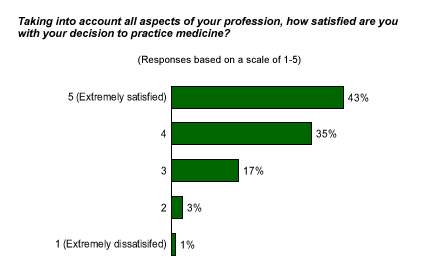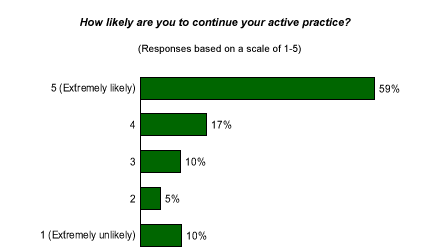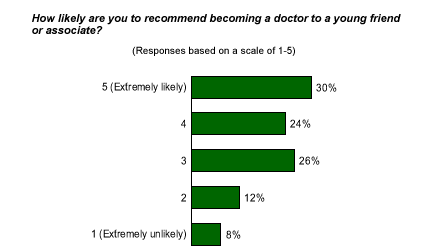Second in a series on engagement levels among black physicians
In 2003 and early 2004, the Sullivan Commission on Diversity in the Healthcare Workforce conducted hearings and forums to gather recommendations and form strategies on how to increase diversity in the health professions workforce. According to the Sullivan Commission, 25% of the U.S. population is black, Hispanic, or American Indian, but these groups account for only 6% of the nation's physicians.
These numbers help drive home the significance of a recent survey that Gallup conducted for the National Medical Association (NMA)*, which showed that only 30% of the black physicians who participated in the survey are engaged with the medical profession (see "Black Physicians Disengaged From Profession" in Related Items). A closer look at the data from this survey also shows that a large number of black physicians are dissatisfied with their decision to practice medicine, and are unlikely to recommend being a doctor to a young friend or associate. These results suggest that, given the current low engagement levels, the number of black physicians isn't likely to increase any time soon.
Black Doctors Score Low in Loyalty
Gallup measures physicians' engagement with the practice of medicine by gauging attitudinal loyalty and emotional attachment. The physician loyalty component of the survey consists of three questions:
- Taking into account all aspects of your profession, how satisfied are you with your decision to practice medicine?
- How likely are you to continue your active practice?
- How likely are you to recommend becoming a doctor to a young friend or associate?
Copyright © 2000 The Gallup Organization, Princeton, NJ. All rights reserved.
Less than half (43%) of survey respondents are "extremely satisfied" with their decision to practice medicine, scoring this question with a "5" on a scale of 1 to 5. About one in five (21%) respondents answered with a "3" or lower.

Despite these relatively low levels of satisfaction with the profession, a larger percentage of black physicians -- 59% -- say that they are "extremely likely" to continue their active practices. However, 25% of respondents rated their likelihood to continue practicing with a "3" or lower.
The more polarized responses to this question suggest that the decision to continue practicing medicine depends on more than simple satisfaction with the profession -- economic or emotional factors may also influence physicians.

Perhaps most telling is the fact that only 30% of black physicians participating in the survey say that they are extremely likely to recommend their profession to a young friend or associate. Forty-six percent rate their likelihood to recommend with a "3" or lower.

Bottom Line
According to a December 2003 article in the Annals of Medicine, increasing the number of minority physicians could improve the healthcare experience for minority patients. The study reports that when patients and doctors are of the same race, patient satisfaction is higher, and the patient is more likely to recommend the physician.
But the Sullivan Commission reports that the percentage of black, Hispanic, and American Indian medical school entrants has declined by 5% in the past year. This drop will further aggravate the underrepresentation of minorities in the physician workforce, making the physician race gap wider, not narrower.
The next article will focus on the emotional elements of physician engagement and how they can be improved among black physicians.
*Results are based on mail interviews with 479 past and present NMA members, administered in July and August 2003.